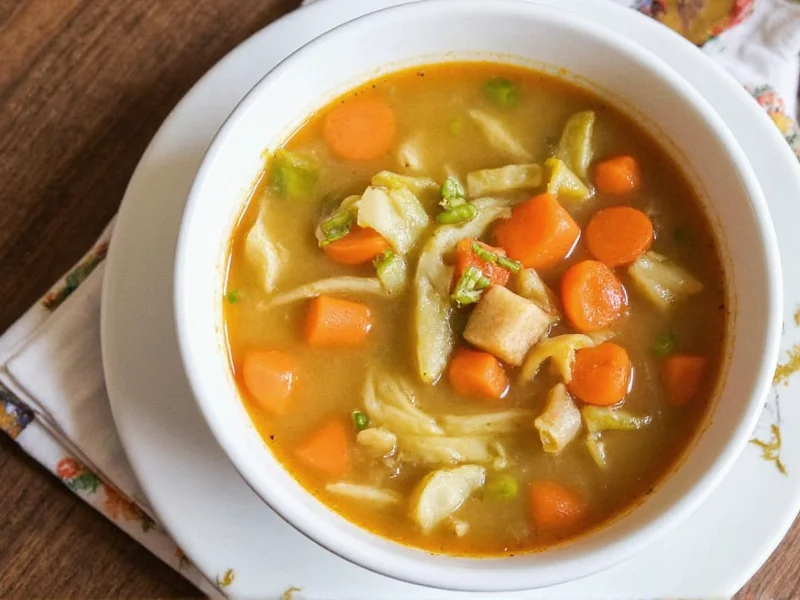Understanding cabbage soup calories helps make informed dietary choices, especially for those managing weight or tracking nutritional intake. This cruciferous vegetable-based soup offers a nutrient-dense option that fits well within balanced eating plans when prepared thoughtfully.
Nutritional Profile of Cabbage Soup Variations
Cabbage soup's calorie content varies significantly based on preparation method and added ingredients. The base vegetable components—cabbage, carrots, celery, and onions—contribute minimal calories while providing valuable fiber and vitamins. The real calorie differences emerge from additional components.
| Soup Type | Calories per Cup | Key Ingredients | Carbohydrates | Protein |
|---|---|---|---|---|
| Basic Vegetable Cabbage Soup | 50-70 | Cabbage, carrots, celery, tomatoes, herbs | 12g | 2g |
| Meat-Added Cabbage Soup | 80-150 | + lean beef or turkey | 15g | 8g |
| Canned Regular Cabbage Soup | 100-200 | Preservatives, sodium, sometimes cream | 20g | 3g |
| Restaurant Cabbage Soup | 150-300+ | Added fats, cream, larger meat portions | 25g | 10g |
Factors Influencing Cabbage Soup Calorie Count
Several elements determine the final calorie content of your cabbage soup. The cooking liquid makes a substantial difference—using water versus broth affects both flavor and calories. Vegetable broth typically adds 10-15 calories per cup, while meat-based broths contribute 20-40 calories.
Fat additions dramatically increase calorie density. One tablespoon of olive oil adds 120 calories, while bacon or fatty meats can add 50-100 calories per serving. Cream or dairy additions transform a low-calorie soup into a higher-calorie meal.
Serving size remains crucial—many people consume 1.5-2 cups per meal, effectively doubling the nutritional values. The cabbage soup diet often recommends larger portions, which impacts total daily calorie intake despite the soup's low density.
Health Benefits Beyond Calorie Count
Cabbage soup offers nutritional advantages that extend beyond its modest calorie profile. Cabbage itself contains vitamin C, vitamin K, and glucosinolates—compounds studied for potential cancer-protective effects. The fiber content (approximately 3-5g per serving) supports digestive health and promotes satiety.
When prepared as a vegetable-focused soup, cabbage soup delivers hydration and electrolytes while being naturally low in sodium—especially compared to canned varieties which often contain 600-800mg of sodium per serving. Homemade versions allow complete control over sodium content, making them suitable for heart-healthy eating patterns.
For those following weight management plans, cabbage soup serves as an excellent volume food—filling the stomach with minimal calories. Registered dietitians often recommend including such high-volume, low-energy-density foods for sustainable weight management rather than extreme cabbage soup diet calories approaches that restrict variety.
Creating Lower-Calorie Cabbage Soup
Producing a nutrient-rich, low-calorie cabbage soup requires strategic ingredient choices. Start with a base of chopped cabbage, onions, carrots, and celery sautéed in minimal olive oil or vegetable broth. Add diced tomatoes, vegetable broth, and herbs like dill or thyme for flavor without extra calories.
For protein without excessive calories, incorporate white beans (½ cup adds about 100 calories and 7g protein) or lean chicken breast (3 oz adds approximately 140 calories and 26g protein). Avoid cream, excessive oils, or fatty meats to maintain the soup's naturally low-calorie advantage.
Season generously with vinegar, lemon juice, or spices rather than salt to enhance flavor in homemade cabbage soup nutrition facts without compromising health goals. Allow the soup to simmer for at least 20 minutes to develop complex flavors from the vegetables themselves.
Understanding Canned Cabbage Soup Nutrition
When selecting store-bought options, carefully examine nutrition labels for canned cabbage soup calorie count variations. Many commercial varieties contain added sugars, preservatives, and excessive sodium that increase calorie density beyond what's expected from vegetables alone.
"Low-sodium" versions typically reduce sodium by 25-40% but may compensate with added starches or sugars that affect the overall nutritional profile. "Hearty" or "gourmet" varieties often include cream or additional grains that can double the calorie content compared to basic vegetable versions.
For those relying on convenience products, compare brands to find options with minimal ingredients and no artificial additives. Some health-focused brands now offer organic, low-sodium cabbage soup with approximately 80-100 calories per serving—significantly better than traditional canned varieties.
Frequently Asked Questions
How many calories in cabbage soup diet recipes?
Traditional cabbage soup diet recipes typically range from 150-250 calories per 2-cup serving. These versions often include minimal additional ingredients beyond cabbage, tomatoes, and onions, keeping the calorie count relatively low while providing volume and hydration.
Is cabbage soup good for weight loss?
Yes, basic cabbage soup can support weight loss efforts as a low-calorie, high-fiber food that promotes satiety. A 1-cup serving of vegetable-based cabbage soup contains only 50-70 calories while providing 3-5 grams of fiber. However, it should be part of a balanced diet rather than used as a sole food source for extended periods.
Does adding meat to cabbage soup significantly increase calories?
Yes, adding meat substantially affects cabbage soup calories. Three ounces of lean ground turkey adds approximately 140 calories and 22g protein to the entire pot, while the same amount of bacon contributes about 160 calories with significantly more fat. For a 4-serving pot, this increases each serving by 35-40 calories for lean meat or 40+ calories for fattier options.
How does cabbage soup compare to other vegetable soups calorie-wise?
Cabbage soup generally contains fewer calories than cream-based vegetable soups but may have slightly more than broth-based alternatives like minestrone (without pasta) or vegetable consommé. A standard cabbage soup ranges from 50-100 calories per cup, while cream of broccoli soup typically contains 150-250 calories per cup due to dairy content.
Can I eat cabbage soup every day for weight loss?
While cabbage soup is low in calories, eating only cabbage soup daily lacks nutritional balance. Short-term use (2-3 days) as part of a varied diet can create a calorie deficit, but prolonged exclusive consumption may lead to nutrient deficiencies. For sustainable weight management, incorporate cabbage soup as one component of a diverse eating pattern that includes adequate protein, healthy fats, and various vegetables.











 浙公网安备
33010002000092号
浙公网安备
33010002000092号 浙B2-20120091-4
浙B2-20120091-4